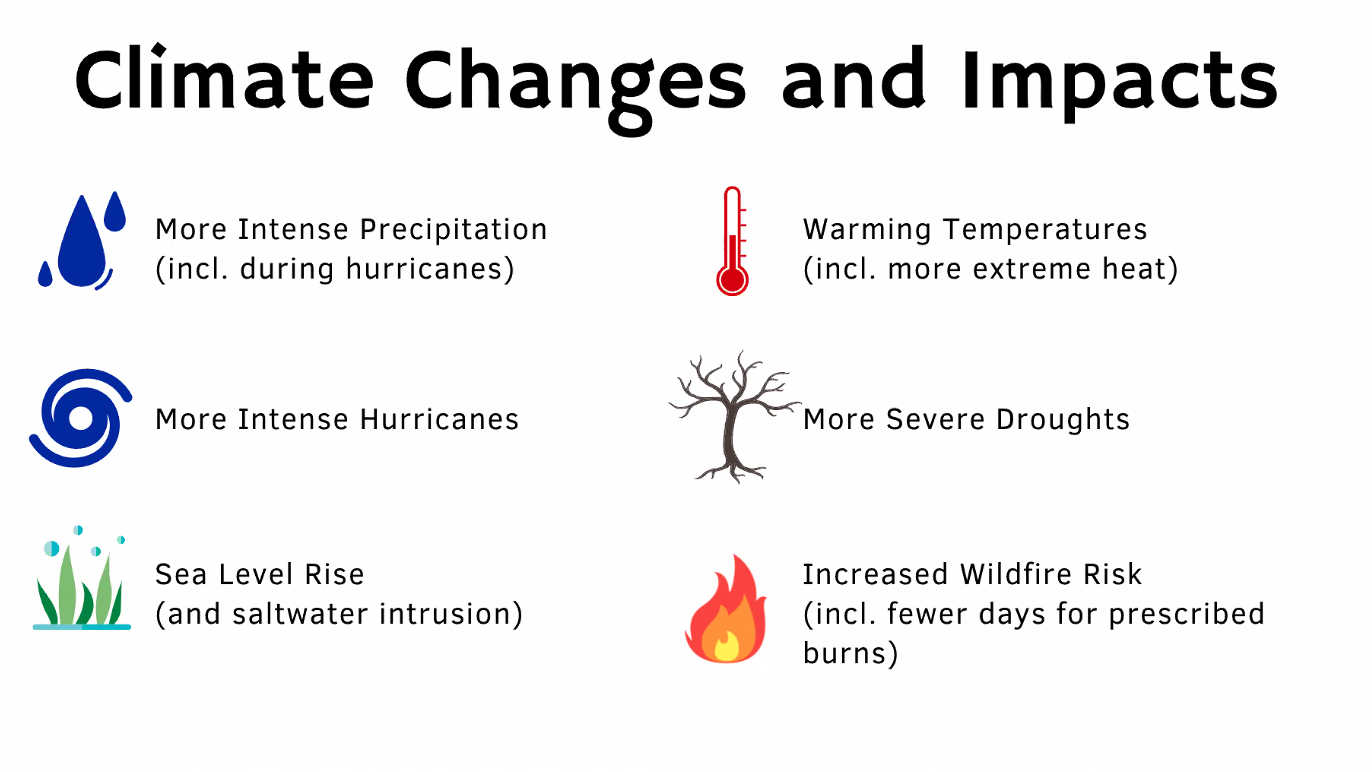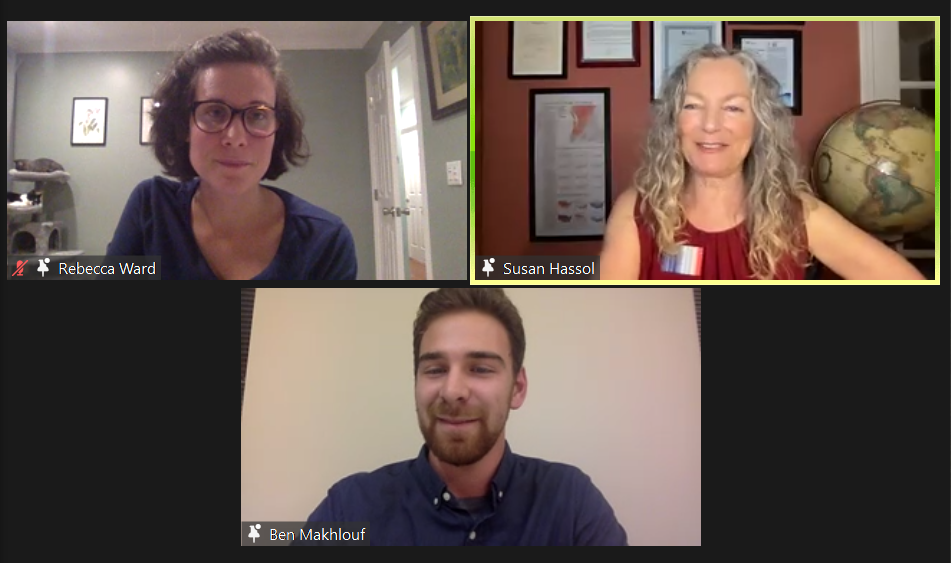Global Change Seminar Summary: Interpreting the Latest IPCC Assessment Report for the U.S. Southeast

This post was written by 2021-22 Global Change Fellow, Andrew Shannon, summarizing the first in the fall Global Change Seminar series, Demystifying the Recent IPCC Assessment Report and “Code Red” on Climate Change, on October 21, 2021. The discussion was moderated by Global Change Fellow, Ben Makhlouf. The seminar planning team also included Madeline Anderson, Regina Ayala Chavez, Smitom Borah, and Olakunle Sodiya.
View a recording of the discussion.

Panelists:
- Susan Joy Hassol, Director, Climate Communication
- Rebecca Ward, Assistant State Climatologist, North Carolina State Climate Office
In August 2021, the Intergovernmental Panel on Climate Change (IPCC), a body of the United Nations tasked with pushing forward the scientific knowledge of climate change, released the first part of their most recent series of reports, known as the Sixth Assessment Report. This report provides the most up-to-date physical understanding of the Earth’s climate system and climate change science. It is based on the assessment and synthesis of thousands of publications produced by hundreds of authors representing sixty-five countries. António Guterres, UN Secretary-General, described the report as a “code red for humanity,” emphasizing the urgency to reduce carbon emissions as the global mean temperature nears closer to 1.5 °C above the pre-industrial baseline level. This threshold represents the limit to warming established by world leaders as a part of the Paris Agreement to avoid the most catastrophic impacts of climate change. Scientific consensus points to emissions from fossil fuel production and other human activities as the predominant driver of this warming trend, which has posed and will continue to pose problematic and challenging impacts to systems and populations around the globe. In response to the publication of this most recent report, the 2021-2022 cohort of Global Change Fellows from the Southeast Climate Adaptation Science Center organized a virtual presentation, titled “Demystifying the Recent IPCC Assessment Report and ‘Code Red’ on Climate Change,” to discuss the report’s findings and the regional implications for the southeastern United States.
Susan Joy Hassol spoke as the first presenter. She is a contributing author to the IPCC Sixth Assessment Report and works to help scientists communicate effectively and provide clear information to policymakers and journalists. With her expertise, she boiled the 1300-page technical report down to five key takeaway messages for the audience. First, consensus of scientific review agrees that human activity is the driver of climate change and has widespread and unprecedented impacts in all Earth systems: the atmosphere, oceans, land, cryosphere, and biosphere. Second, these impacts have already exacerbated extreme weather events in all regions of the globe. Third, trends show that the global mean temperature will exceed the 1.5 °C threshold around 2040, which is about a decade earlier than previous projections indicated. Fourth, Susan noted that immediate action today to reduce greenhouse gas emissions can still mitigate the most damaging effects of climate change in the coming decades. These efforts require rapid changes in global energy systems, preservation of forests and other landscapes, and adjustments to industrial agricultural practices. The last takeaway message emphasized that every ton of emissions adds to warming and each increment of warming beyond 1.5 °C contributes to more severe impacts. Susan offered the analogy of driving on a highway – if you miss an exit, like surpassing the 1.5 °C threshold, you get off at the next possible exit. That is, the urgency to curb emissions will continue even if the global mean temperature nears 2 °C or greater above the baseline – every increment matters. Susan noted that this is a critical year and a critical decade for making decisions and taking actions.

Rebecca Ward spoke as the next presenter. She works with a variety of audiences on climate education and supports decision making for various sectors that use climate data in the state of North Carolina and throughout the Southeast region. Based on the most recent report, Rebecca highlighted two important developments in comparison to previous reports. The most recent report demonstrates more certainty in the projected trends and impacts of climate change, and based on these findings, the authors wrote the report using language that emphasizes the urgency of the topic. As a regional expert, Rebecca was able to contextualize the findings of the report within the impacts and concerns of North Carolina and the southeastern United States. She noted that as climate change intensifies the global water cycle that the Southeast will experience more extreme precipitation events, as well as more prolonged periods of drought. Increasing daytime and nighttime temperatures will impact human health during heat waves and limit the timeframes to conduct management work, such as prescribed fires, that address wildfire risk in the state. Existing and future sea level rise, compounded with more intense storm surges from hurricanes, will increase the risk of flood events in coastal and inland areas. Importantly, the Southeast is a region experiencing rapid urbanization, and these land use changes will increase the exposure of populations and infrastructure to extreme weather events thereby exacerbating the resulting impacts. Rebecca grounded the audience in describing on-going stories of mitigation and adaptation strategies in the region. She emphasized the agency we have as researchers, communicators, and individuals who are able to contribute to collective action and inform these strategies to make meaningful change.
After their presentations, Susan and Rebecca responded to questions from the audience – 75 attendees representing a variety of career levels and areas of interest. The discussion touched on a range of topics, including the attribution of weather events to climate change, contextualizing mitigation strategies in the current landscape of the energy sector, and best practices for climate science communication. The presenters emphasized that communication is most effective when communicators are able to connect with the values people actually care about, whether that be fishing or the energy they use to keep their beer cold and their showers hot. The conversation ended with the presenters empowering participants to understand their role in enacting systemic change and to address current and future climate impacts. We thank the presenters for a wonderful seminar as we celebrate ten years of the Global Change Fellows program at the Southeast Climate Adaptation Science Center.
View seminar recording.
- Categories:
